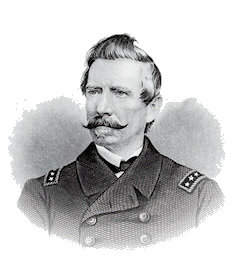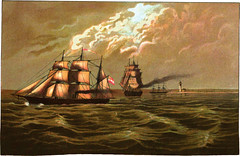From Service Afloat: Or, The Remarkable Career of the Confederate Cruisers Sumter and Alabama, During the War Between the States, by Rafael Semmes, beginning on page 116.
Here the conversation dropped, for an officer now came to report to me that a boat had just shoved off from the pilots’ station, evidently with a pilot in her. Casting my eyes in the given direction, I saw a whale-boat approaching us, pulled by four stout blacks, who were bending like good fellows to their long ashen oars, and in the stern-sheets was seated, sure enough, the welcome pilot, swaying his body to, and fro, as his boat leaped under the oft-repeated strokes of the oars, as though he would hasten her already great speed. But more beautiful still was another object which presented itself. In the balcony of the pilot’s house, which had been built in the very marsh, on the margin of the river, there stood a beautiful woman, the pilot’s young wife, waving him on to his duty, with her handkerchief. We could have tossed a biscuit from the Sumter to the shore, and I uncovered my head gallantly to my fair countrywoman. A few moments more, and a tow-line had been thrown to the boat, and the gallant young fellow stood on the horse-block beside me.
As we swept past the light-house wharf, almost close enough to touch it,  there were other petticoats fluttering in the breeze, the owners of which were also waving handkerchiefs of encouragement to the Sumter. I could see my sailors’ eyes brighten at these spectacles, for the sailor’s heart is capacious enough to love the whole sex, and I now felt sure of their nerves, in case it should become necessary to tax them. Half a mile or so, from the light-house, and the bar is reached. There was a Bremen ship lying aground on the bar, and there was just room, and no more, for us to pass her. She had run out a kedge, and had a warp attached to it that was lying across the passage-way. The crew considerately slackened the line, as we approached, and in another bound the Sumter was outside the bar, and the Confederate flag was upon the high seas! We now slackened our speed, for an instant —only an instant, for my officers and men all had their wits about them, and worked like good fellows—to haul the pilot’s boat alongside, that he might return to the shore. As the gallant young fellow grasped my hand, and shook it warmly, as he descended from the horse-block, he said, “Now, Captain, you are all clear; give her h—ll, and let her go!”
there were other petticoats fluttering in the breeze, the owners of which were also waving handkerchiefs of encouragement to the Sumter. I could see my sailors’ eyes brighten at these spectacles, for the sailor’s heart is capacious enough to love the whole sex, and I now felt sure of their nerves, in case it should become necessary to tax them. Half a mile or so, from the light-house, and the bar is reached. There was a Bremen ship lying aground on the bar, and there was just room, and no more, for us to pass her. She had run out a kedge, and had a warp attached to it that was lying across the passage-way. The crew considerately slackened the line, as we approached, and in another bound the Sumter was outside the bar, and the Confederate flag was upon the high seas! We now slackened our speed, for an instant —only an instant, for my officers and men all had their wits about them, and worked like good fellows—to haul the pilot’s boat alongside, that he might return to the shore. As the gallant young fellow grasped my hand, and shook it warmly, as he descended from the horse-block, he said, “Now, Captain, you are all clear; give her h—ll, and let her go!”
We had now nothing to do, but turn our attention to the enemy. The Brooklyn, as we cleared the bar, was about three and a half, or four miles distant; we were therefore just out of reach of her guns, with nothing to spare. Thick volumes of smoke could be seen pouring from the chimneys of both ships; the firemen, and engineers of each evidently doing their best. I called a lieutenant, and directed him to heave the log. He reported our speed to be nine, and a half knots. Loth to believe that we could be making so little way, through the yet turbid waters, which were rushing past us with great apparent velocity, I directed the officer to repeat the experiment; but the same result followed, though he had paid out the line with a free hand. I now sent for the engineer, and, upon inquiry, found that he was doing his very best—“though,” said he, “there is a little drawback, just now, in the ‘foaming’ of our boilers, arising from the suddenness with which we got up steam; when this subsides, we may be able to add half a knot more.”
The Brooklyn soon loosed, and set her sails, bracing them sharp up on the starboard tack. I loosed and set mine, also. The enemy’s ship was a little on my weather quarter, say a couple of points, and had thus slightly the weather-gauge of me. As I knew I could lay nearer the wind than she, being able to brace my yards sharper, and had besides, the advantage of larger fore-and-aft sails, comparatively, stay-sails, try-sails, and a very large spanker, I resolved at once to hold my wind, so closely, as to compel her to furl her sails, though this would carry me a little athwart her bows, and bring me perhaps a little nearer to her, for the next half hour, or so. A rain squall now came up, and enveloped the two ships, hiding each from the other. As the rain blew off to leeward, and the Brooklyn reappeared, she seemed fearfully near to us, and I began to fear I should realize the foreboding of my lieutenant. I could not but admire the majesty of her appearance, with her broad flaring bows, and clean, and beautiful run, and her masts, and yards, as taunt and square, as those of an old time sailing frigate. The stars and stripes of a large ensign flew out from time to time, from under the lee of her spanker, and we could see an apparently anxious crowd of officers on her quarter-deck, many of them with telescopes directed toward us. She had, evidently, I thought, gained upon us, and I expected every moment to hear the whiz of a shot; but still she did not fire.
I now ordered my paymaster to get his public chest, and papers ready for throwing overboard, if it should become necessary. At this crisis the engineer came up from below, bringing the welcome intelligence that the “foaming” of his boilers had ceased, and that his engine was “working beautifully,” giving the propeller several additional turns per minute. The breeze, too, favored me, for it had freshened considerably; and what was still more to the purpose, I began to perceive that I was “eating” the Brooklyn “out of the wind ”; in other words, that she was falling more and more to leeward. I knew, of course, that as soon as she fell into my wake, she would be compelled to furl her sails. This she did in half an hour or so afterward, and I at once began to breathe more freely, for I could still hold on to my own canvas. I have witnessed many beautiful sights at sea, but the most beautiful of them all was when the Brooklyn let fly all her sheets, and halliards, at once, and clewed up, and furled, in man-of-war style, all her sails, from courses to royals. We now began to gain quite perceptibly on our pursuer, and at half-past three, the chase was abandoned, the baffled Brooklyn retracing her steps to Pass à l’Outre, and the Sumter bounding away on her course seaward.
We fired no gun of triumph in the face of the enemy—my powder was too precious for that—but I sent the crew aloft, to man the rigging, and three such cheers were given for the Confederate flag, “that little bit of striped bunting,” that had waved from the Sumter’s peak during the exciting chase, as could proceed only from the throats of American seamen, in the act of defying a tyrant—those cheers were but a repetition of many such cheers that had been given, by our ancestors, to that other bit of “striped bunting ” which had defied the power of England in that olden war, of which our war was but the logical sequence.
